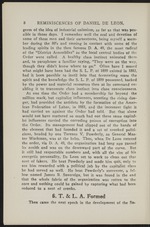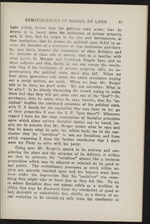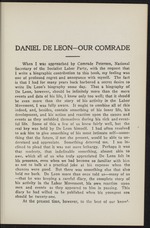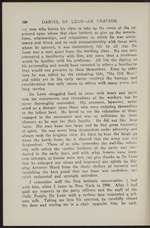| 1 |
 |
“...8
REMINISCENCES OF DANIEL DE LEON.
germ of the idea of industrial unionism, as far as that was pos-
sible in those days. I remember well the zeal and devotion of
some of these men and their earnestness, being myself a mem-
ber during the 80s and coming in contact with some of the
leading spirits in the then famous D. A. 49, the most radical
of the "District Assemblies as the local central bodies of the
Order were called. A healthy class instinct animated them
and, to paraphrase a familiar saying, They were on the way,
though they didnt know where to go. Often have I mused
what might have been had the S. L. P. of 1899 existed in 1883,
had it been possible to instil into that fermenting mass the
spirit and the knowledge the S. L. P. of 1899 possessed, backed
by the power and material resources then at its command en-
abling it to transmute class instinct into class consciousness.
At one time the Order had a membership far beyond the
million mark, but capitalist influences, scenting the rising...”
|
|
| 2 |
 |
“...REMINISCENCES OF DANIEL DE LEON. 71
hgiit Withal, knows how the political state arose; that he
knows u IS based upon the institution of private property
and. in fact, had its origin in the rise and development of
that institution; that he knows the political state HAD to as-
sume the function of a protector of that institution and there-
by, ipso facto, became the maintainer of class divisions and
the defender of class rule in society; that he is familiar with
vvhat Le^wis H. Morgan and Frederick Engels have said on
hese subjects and that, lastly, he can not escape the conclu-
.lon that, if the institution of private property falls its su-
perstructure, the political state, must also fall. When we
hear some ignoramus talk about the social revolution buying
out a social system, we smile. When we hear Mr. Berger
talk a* he does, we dont smile. We ask ourselves- What is
?hem feM u, <='-wd, trying to make
eni feel that they will get some coin out of the deal"? Or
perchance, does he mean what...”
|
|
| 3 |
 |
“...a few of us knew fairly well, but the
real key was held by De Leon himself. I had often resolved
to ask him to give something of his most intimate selfsome-
thing that the future, if not the present, would be able to un-
derstand and appreciate. Something deterred me. I am in-
clined to plead that it was not mere lethargy. Perhaps it was
that modesty, that indefinable something, almost akin to
awe, which all of us who truly appreciated De Leon felt in
his presence, even when we had become so familiar with him
as not to balk at a practical joke at his expense when the
chances were good. But there was something else that also
held me back. De Leon more than once told usmany of us
that he was keeping a careful diary, the complete story of
his activity in the Labor Movement, his own reaction upon
men and events as they appeared to him in passing. This
diary he had willed to be published when his youngest son
should be twenty-one.
At the present time, however, to the best of our know'-...”
|
|
| 4 |
 |
“...184 DANIEL DE LEONAN ORATION.
cry man who leaves his class to take up the cause of th* op-
pressed upon whom that class battens, to give up the associa-
tions, relationships, and relaxations to which he was accus-
tomed and fitted, and to seek companioniship with those with
whom he labored, it was instinctively felt by all that De
Leon was a man apart from the working class. No one ever
attempted a familiarity with him, any more than a freshman
would be familiar with his professor. All felt the dignity of
his personality and would have resented in others a familiarity
they would not presume to show themselves. Even by older
men he was called by the endearing title, the Old Man,
and while yet in his early career received the homage and
consideration that only comes to others with many years and
long service.
De Leon struggled hard to enter with heart and spirit
into the enjoyments and recreations of the workers, but he
never thoroughly succeeded. His presence, however, never
acted as a damper...”
|
|
